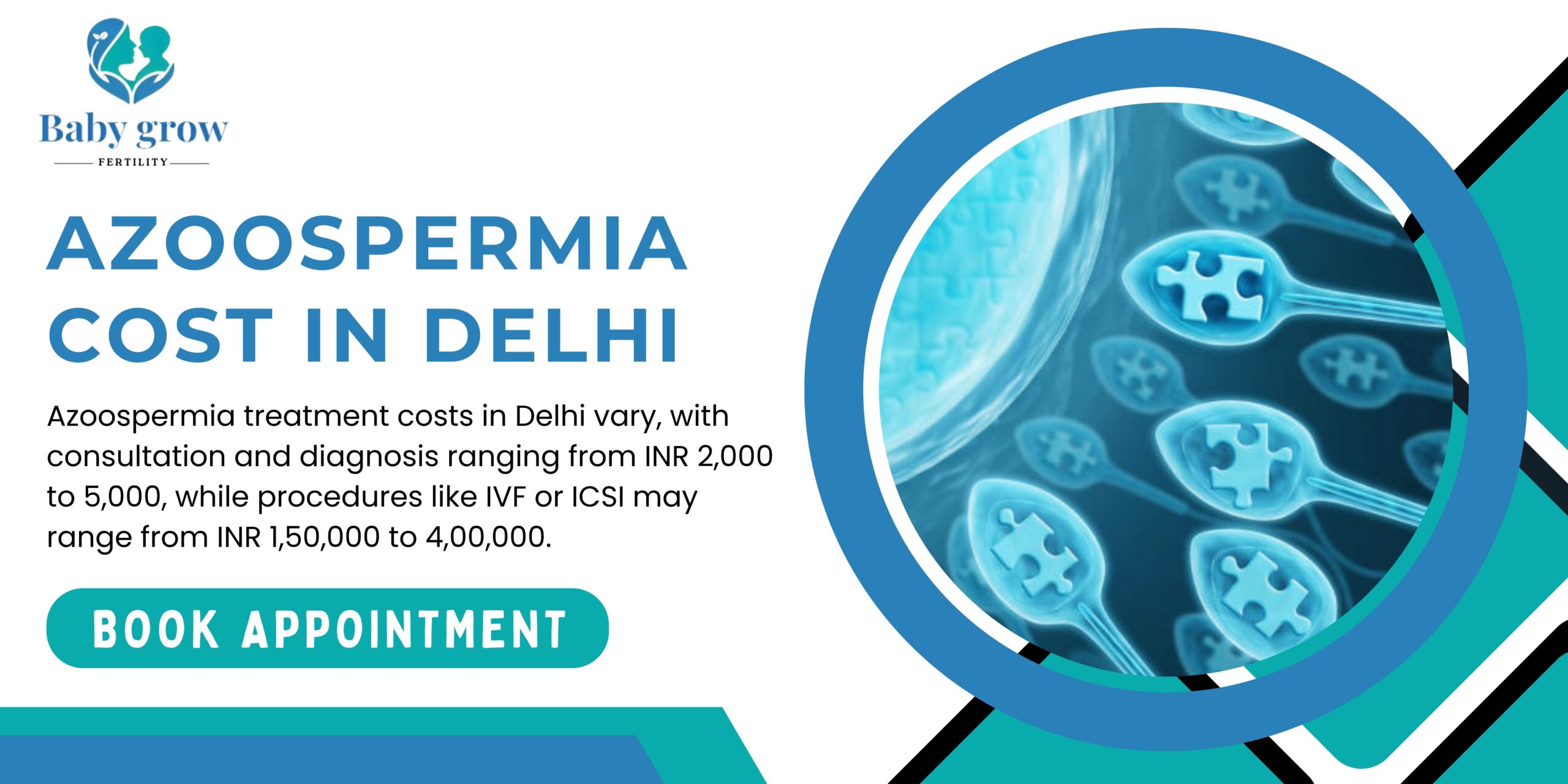Starting the process of treating azoospermia-related male infertility is an optimistic and emotional endeavour. We at Baby Grow Fertility in Delhi are aware of how difficult this journey may be.
Our commitment goes beyond just medical expertise; it’s about providing a supportive environment. Understanding the emotional aspects, coupled with the need for clarity, we present transparent information about the Azoospermia Cost in Delhi.
We believe that addressing the financial concerns associated with treatment is as vital as addressing the emotional aspects, ensuring that every step towards overcoming azoospermia is one of resilience, hope, and ultimately, the joy of parenthood.
What is Azoospermia and Why Should I Consider?
Azoospermia is a male infertility condition characterized by the absence of sperm in ejaculated semen. It presents a significant challenge for couples trying to conceive. Understanding Azoospermia is crucial as it directly impacts fertility.
There are two main types: obstructive, where sperm production is normal but blocked, and non-obstructive, where the testicles produce little to no sperm. Seeking medical advice is essential to determine the cause and explore potential treatments.
Assisted reproductive technologies like IVF with sperm retrieval can offer hope for fatherhood. It’s essential for individuals facing Azoospermia to consult with fertility specialists to assess the best course of action based on the specific diagnosis and individual circumstances.
Azoospermia Treatment Options
Azoospermia treatment options include surgical interventions, hormone therapy, and assisted reproductive techniques like ICSI. Tailored approaches address the diverse causes, offering hope and solutions on the path to parenthood.
Medical Interventions
Medical interventions for Azoospermia encompass a range of approaches aimed at addressing hormonal imbalances and physical obstacles hindering sperm production. Hormone therapy, the first subheading under medical interventions, involves the administration of hormones to regulate and optimize reproductive function. This targeted approach aims to correct hormonal imbalances that may contribute to Azoospermia, enhancing the chances of natural conception.
Surgical approaches, the second subheading, delve into procedures designed to address physical impediments obstructing the sperm’s pathway. Surgical interventions may include repairing blockages or retrieving sperm directly from the reproductive system. These procedures, performed by skilled fertility specialists, aim to overcome anatomical challenges and restore the natural flow of sperm, increasing the likelihood of successful conception.
Assisted Reproductive Technologies (ART)
Assisted Reproductive Technologies (ART) represent advanced medical interventions that offer hope to individuals with Azoospermia. In Vitro Fertilization (IVF), the first subheading under ART, involves the fertilization of an egg with sperm outside the body, followed by the transfer of the embryo into the uterus. IVF is a widely employed technique, especially when Azoospermia is associated with factors that impact natural conception.
Intracytoplasmic Sperm Injection (ICSI), the second subheading, is a specialized form of IVF that addresses severe male infertility. In ICSI, a single sperm is directly injected into an egg to facilitate fertilization. This precise method is particularly beneficial when the male partner has a low sperm count or issues with sperm motility. Both IVF and ICSI open new avenues for individuals facing Azoospermia, providing alternatives to traditional conception methods.
Cost Factors in Azoospermia Treatment
In the realm of Azoospermia treatment, understanding the financial aspects is crucial for individuals and couples seeking to overcome fertility challenges. The cost factors can be categorized into three main areas: consultation and diagnosis costs, treatment procedure costs, and medication costs.
Consultation and Diagnosis Costs
Initiating the journey toward addressing Azoospermia involves consultation and diagnostic processes. This includes initial appointments with fertility specialists, diagnostic tests, and evaluations to determine the underlying causes. These costs lay the foundation for developing a tailored treatment plan.
Treatment Procedure Costs
Treatment procedures for Azoospermia encompass various medical interventions, each with its associated costs. This section delves into the breakdown of treatment procedure expenses, including hormone therapy, surgical procedures, and assisted reproductive technologies (ART).
1. Hormone Therapy Expenses: Hormone therapy is a common approach to address hormonal imbalances contributing to Azoospermia. This subsection explores the financial aspects related to hormonal treatments, detailing the costs associated with medication and monitoring.
2. Surgical Procedure Expenses: Surgical interventions may be recommended for cases where anatomical issues hinder sperm production. The financial considerations for surgical procedures, encompassing pre-operative assessments, the surgical process itself, and post-operative care, are outlined in this section.
3. ART Costs: Assisted Reproductive Technologies (ART) offer advanced solutions for Azoospermia. Within this category, in vitro fertilization (IVF) and intracytoplasmic sperm injection (ICSI) are highlighted, with dedicated insights into the associated expenses.
- IVF Expenses: In vitro fertilization involves combining eggs and sperm outside the body before implanting the fertilized embryo into the uterus. This section elaborates on the costs tied to IVF, covering procedures such as egg retrieval, fertilization, and embryo transfer.
- ICSI Expenses: Intracytoplasmic sperm injection is a specialized form of IVF where a single sperm is directly injected into an egg. This subsection details the financial aspects of ICSI, including the intricacies of the procedure and associated laboratory costs.
Medication Costs
Medications play a vital role in Azoospermia treatment, addressing hormonal imbalances, supporting reproductive processes, and enhancing fertility. This part of the outline explores the various medications prescribed during the course of treatment and their associated costs, shedding light on an integral aspect of the overall financial considerations.
What is The Procedure of Azoospermia treatment?
Azoospermia treatment involves a comprehensive and multi-faceted approach, tailored to address the specific causes and factors contributing to the absence of sperm in the ejaculate. A number of steps are usually included in the process, including as diagnostics, medical treatments, and assisted reproductive technologies. Here is an overview of the general procedure for Azoospermia treatment:
1. Diagnosis
The first crucial step in treating Azoospermia is an accurate diagnosis. This include a physical examination, a number of diagnostic tests, and a comprehensive review of the patient’s medical history. One essential test to ascertain whether sperm are absent is semen analysis. Additionally, blood tests, genetic screenings, and imaging studies may be conducted to identify the underlying causes, whether they are obstructive or non-obstructive.
2. Hormone Therapy
For cases where hormonal imbalances contribute to Azoospermia, hormone therapy is often prescribed. This involves the administration of specific hormones to regulate and optimize the hormonal milieu, potentially restoring sperm production. Regular monitoring and adjustments to the hormone regimen are part of this phase.
3. Surgical Interventions
Surgical procedures may be recommended for cases of obstructive Azoospermia, where physical blockages prevent the release of sperm. Vasectomy reversal and testicular or epididymal sperm extraction are surgical possibilities. These procedures aim to retrieve sperm directly from the reproductive system, allowing for its use in assisted reproductive technologies.
4. Assisted Reproductive Technologies (ART)
For cases where natural conception is challenging, or if surgical interventions are not feasible, assisted reproductive technologies come into play. Two primary techniques are commonly used:
- In Vitro Fertilization (IVF): In this process, eggs are retrieved from the female partner and combined with sperm in a laboratory setting. The resulting embryos are then implanted into the uterus.
- Intracytoplasmic Sperm Injection (ICSI): ICSI involves the direct injection of a single sperm into an egg, facilitating fertilization. This technique is particularly useful in cases where sperm quantity or quality is limited.
5. Medication and Supportive Therapies
Throughout the treatment journey, patients may be prescribed medications to support overall reproductive health, enhance sperm production, or address any underlying health issues. Lifestyle modifications, including dietary changes, exercise, and stress management, may also be recommended to optimize fertility.
6. Follow-up and Monitoring
After initiating treatment, regular follow-up appointments and monitoring are essential to assess the progress of the intervention. Adjustments to the treatment plan may be made based on the individual’s response and any emerging considerations.
How Much Does Azoospermia Cost in Delhi?
The cost of addressing Azoospermia in Delhi can vary based on several factors, including the type of treatment, the clinic’s reputation, and the specific needs of the individual or couple undergoing the fertility journey. Consultation and diagnosis costs typically range from INR 2,000 to INR 5,000, encompassing initial appointments, diagnostic tests, and evaluations to determine the root cause of Azoospermia.
Treatment procedure costs can vary significantly. Hormone therapy, a common approach to address hormonal imbalances, may incur expenses ranging from INR 10,000 to INR 30,000, depending on the duration and type of medication. Surgical procedures, often recommended for anatomical issues hindering sperm production, can range from INR 50,000 to INR 2,00,000, covering pre-operative assessments, the surgical process, and post-operative care.
Assisted Reproductive Technologies (ART) offer advanced solutions, with in vitro fertilization (IVF) and intracytoplasmic sperm injection (ICSI) being prominent. IVF expenses typically range from INR 1,50,000 to INR 3,00,000, covering procedures such as egg retrieval, fertilization, and embryo transfer. ICSI, a specialized form of IVF, may incur additional costs, with prices ranging from INR 2,00,000 to INR 4,00,000.
Medication costs, an integral part of Azoospermia treatment, can vary based on the prescribed medications and the duration of treatment. Generally, medication expenses may range from INR 10,000 to INR 50,000.
It’s important to remember that these are only estimates, and that real expenses may change depending on specific needs, clinic regulations, and the need for any further services or assistance. It is recommended that prospective individuals seek advice from reproductive clinics and specialists in order to receive customized cost estimates that are correct for their particular circumstances.
Conclusion
Baby Grow Fertility in Delhi not only illuminates the complexities of azoospermia but also offers an empathetic and transparent approach to the associated costs.
Our commitment to comprehensive care ensures that navigating the financial aspect is as seamless as addressing the emotional nuances. The Azoospermia Cost in Delhi is not just a figure; it symbolizes an investment in the profound journey towards overcoming infertility.
With a blend of medical expertise, emotional support, and transparent information, we strive to make the dream of parenthood a tangible reality, offering solace and optimism to those on the path to building their families.




